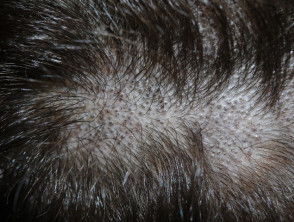

Objects or surfaces used by the infected person or animal.It gets transmitted to the individual through contact with:

#Tinea capitis scalp symptoms skin#
We call it so because it creates circular marks on the skin with flat centers and raised border. Unlike the name, ringworm is not a worm but a fungal infection. Yes, ringworm of scalp is a highly contagious fungal infection.

#Tinea capitis scalp symptoms how to#
Related Reading: How to Get Rid of Ringworm? These tender or painful spots also have small black dots where the hair has broken off at the scalp. The infected skin develops patches which expand or enlarge slowly.Īs the infection develops the hair become brittle or fragile leading to loss of hair from the area. Tinea capitis is characterized by scaly, gray or reddened areas or patches on the scalp. Maintaining good hygiene, cleanliness and taking proper medications can help to control and treat the spread of infection. The causes of tinea capitis can be direct contact with an infected person, pet, or objects such as bed linen, combs or brushes, and clothing.Īfter invasion dermatophytes start digesting tissue’s keratin (protein). The fungi cause skin and hair infections.įound in humans, domestic animals, and soil, this fungus invades the ruptured shaft or hair scalp through the outer layer of the skin (stratum corneum). Ringworm on scalp (tinea capitis) occurs due to mold-like fungal organisms called dermatophytes. Related Reading: How to Get Rid of the Scabs on Scalp


 0 kommentar(er)
0 kommentar(er)
